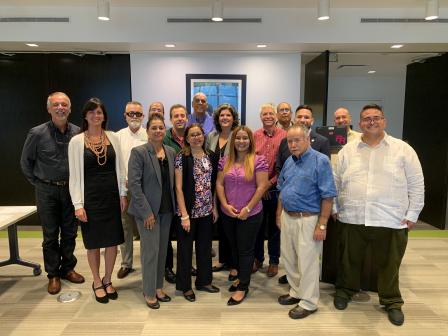News Releases from Region 02
EPA Initiative Promotes Stronger, More Effective Septic Systems in the Caribbean
Septic Systems Workshop to be Held on February 28th in Juana Diaz, Puerto Rico
(New York, N.Y.) In its continuing efforts to help the Caribbean recover from the long-term impacts from Hurricanes Irma and Maria, the U.S. Environmental Protection Agency (EPA) has launched an initiative to help make septic systems more sustainable and resilient. The Caribbean Septic Systems Workgroup (CSSW) is engaging communities, non-profit organizations, and government agencies to bring about real solutions for the residents of Puerto Rico and the U.S. Virgin Islands (USVI).
“Over 40 percent of the population living in Puerto Rico and 50 percent of the population living in the USVI rely upon septic systems to dispose of domestic wastewaters. The prevalence of the septic systems is due to limited resources, soil conditions, and the lack of wastewater systems, including sewage piping and wastewater treatment plants,” said EPA Regional Administrator Pete Lopez. “We are proud to convene our partners to work together to strengthen management of septic systems in Puerto Rico and the USVI, using the relationships forged in hurricane response efforts as a vehicle for transforming communities through community-driven solutions.”
On February 28, 2019, RCAP Solutions Inc., one of the members of the CSSW, will hold a septic systems workshop in Juana Diaz, Puerto Rico. This workshop, which is open and free to the public, is part of a series of training sessions and projects planned by the CSSW in the Caribbean. The goal is to ensure that communities, individuals, businesses, and local governments have access to accurate information on septic system construction, management, and maintenance; local permit requirements; and can effectively participate in managing human health and environmental risks.
SEPTIC SYSTEMS WORKSHOP:
Feb. 28, 1:00 p.m. to 5:00 p.m.
Centro Cultural CAYACOLL, Carr. 512 km. 0.8, Bo. Cayabo, Juana Díaz, PR
(18.060278, -66.535278)
HOW TO REGISTER:
Register at http://bit.ly/Septicos2019 or contact the facilitator of this event: Carlos Velazquez, cvelazquez-figueroa@rcapsolutions.org, (787) 664-7476
Background:
Septic systems are used to treat and dispose of relatively small volumes of wastewater, usually from houses and businesses located in suburban and rural locations not served by centralized public sewer systems. More than 60 million people in the U.S. are served by septic systems. Septic systems that are properly planned, designed, sited, installed, operated and maintained can provide excellent wastewater treatment. However, systems that are sited in densities that exceed the treatment capacity of regional soils and systems that are poorly designed, installed, operated or maintained can cause problems, which is the issue in the Caribbean.

Initial meeting of the Caribbean Septic Systems Workgroup.
December 12, 2018, Guaynabo, Puerto Rico. Photo courtesy of U.S. EPA.
The Caribbean is especially vulnerable to the disruption of its septic systems due to tropical flooding, oversaturation of soil, erosion, lack of clean water, including, but not limited to, surface, ground, and drinking water pollution. The CSSW focuses on improving the septic system sector since many septic systems are not operated and maintained to prevent pollution or were poorly designed, constructed, and maintained. Also, of concern are areas of sensitive geographic characteristics such as the Karst region in Puerto Rico and areas susceptible to sink holes.
There are other opportunities for members of CSSW to assist EPA and CSSW to deliver more customer value and improved mission outcomes for the Caribbean. For example, the San Juan Bay Estuary Program is working on a project to assist EPA’s goals to clean local waters and the San Juan Bay Estuary’s watershed by identifying driving actions to address septic systems related issues in vulnerable communities in the Estuary, which can be replicated in other watersheds in the Caribbean. This project includes accountability features to guide sweeping actions to restore clean water in the Estuary and the region’s streams, creeks, and rivers. EPA, CSSW, and the Estuary Program are collaborating and integrating efforts to continue to work on this project, such as a second septic systems workshop to be held in April 2019.
The CSSW is composed of the federal government, state, and local stakeholders, counterparts, and clients, including:
Federal Government:
o EPA (Headquarters, Region 2, Region 9)
o U.S. Department of Agriculture
o U.S. Department of Housing and Urban Development
o U.S. Geological Survey
State and Local Government:
o U.S. Virgin Islands Department of Planning and Natural Resources
o Junta de Calidad Ambiental de Puerto Rico
o Departamento de Recursos Naturales y Ambientales de Puerto Rico
o Departamento de Salud de Puerto Rico
o Oficina de Gerencia de Permisos de Puerto Rico
o Junta de Planificación de Puerto Rico
o Departamento de la Vivienda de Puerto Rico
o Hawaii Department of Health Office of Environmental Quality Control
Academia:
o University of Puerto Rico at Mayagüez
o Polytechnic University of Puerto Rico
o Interamerican University of Puerto Rico at San German
o University of the Virgin Islands
o University of Puerto Rico at Rio Piedras
o Ana G. Mendez University System
Non-Governmental Organizations
o USVI Coral Bay Community Council, Inc.
o Protectores de Cuencas Inc.
o Centro de Microempresas y Tecnologías Agrícolas Sustentables Yauco Inc.
o Fideicomiso de Conservación e Historia de Vieques
o Programa del Estuario de la Bahía de San Juan
o RCAP Solutions
o Enterprise Community Partners, Inc.
o Colegio de Ingenieros y Agrimensores de Puerto Rico
For information about the EPA’s septic system programs, please visit https://www.epa.gov/septic and in Spanish at Sistemas Sépticos.
19-007
